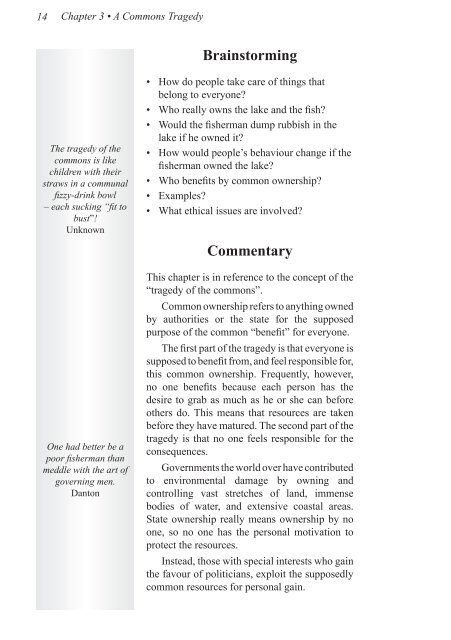- Page 1 and 2: The Adventures Of JONATHAN GULLIBLE
- Page 3 and 4: About This Book About the Book This
- Page 5 and 6: About the Author About the Author K
- Page 7 and 8: Contents Chapter Page 13 Helter She
- Page 9 and 10: Contents Chapter Page Epilogue . .
- Page 11 and 12: Jonathan’s Guiding Principles Jon
- Page 13 and 14: Chapter 1 A Great Storm In a sunny
- Page 15: You own your life. To deny this is
- Page 18 and 19: 6 Chapter 2 • Troublemakers “Sh
- Page 20 and 21: 8 Chapter 2 • Troublemakers Among
- Page 23 and 24: Chapter 3 A Commons Tragedy The tra
- Page 25: Chapter 3 • A Commons Tragedy 13
- Page 29 and 30: Chapter 4 The Food Police Paths con
- Page 31 and 32: Products and production belong to t
- Page 33 and 34: Chapter 5 Candles and Coats Jonatha
- Page 35 and 36: Chapter 5 • Candles and Coats 23
- Page 37 and 38: When our economies are entwined we
- Page 39 and 40: Chapter 6 The Tall Tax As Jonathan
- Page 41 and 42: We, and all others who believe in f
- Page 43 and 44: Chapter 7 Best Laid Plans Dull two-
- Page 45 and 46: Chapter 7 • Best Laid Plans 33 An
- Page 47: Many visitors wonder why Geneva, on
- Page 50 and 51: 38 Chapter 8 • Two Zoos The guard
- Page 52 and 53: 40 Chapter 8 • Two Zoos The State
- Page 54 and 55: 42 Chapter 9 • Making Money soar;
- Page 56 and 57: 44 Chapter 9 • Making Money Why i
- Page 58 and 59: 46 Chapter 9 • Making Money The o
- Page 60 and 61: 48 Chapter 10 • The Dream Machine
- Page 62 and 63: 50 Chapter 10 • The Dream Machine
- Page 64 and 65: 52 Chapter 10 • The Dream Machine
- Page 66 and 67: 54 Chapter 10 • The Dream Machine
- Page 68 and 69: 56 Chapter 11 • Power Sale Perhap
- Page 70 and 71: 58 Chapter 11 • Power Sale Lords
- Page 72 and 73: 60 Chapter 11 • Power Sale No mat
- Page 74 and 75: www.freemarketfoundation.com
- Page 76 and 77:
64 Chapter 12 • Opportunity Lost
- Page 78 and 79:
66 Chapter 12 • Opportunity Lost
- Page 80 and 81:
68 Chapter 13 • Helter Shelter co
- Page 82 and 83:
70 Chapter 13 • Helter Shelter
- Page 84 and 85:
72 Chapter 13 • Helter Shelter Ci
- Page 86 and 87:
74 Chapter 14 • Escalating Crimes
- Page 88 and 89:
76 Chapter 14 • Escalating Crimes
- Page 90 and 91:
78 Chapter 14 • Escalating Crimes
- Page 92 and 93:
80 Chapter 15 • Book Battles “L
- Page 94 and 95:
82 Chapter 15 • Book Battles By n
- Page 96 and 97:
84 Chapter 15 • Book Battles Your
- Page 98 and 99:
Free-market.net Freedom Network htt
- Page 100 and 101:
88 Chapter 16 • Nothing To It the
- Page 102 and 103:
90 Chapter 16 • Nothing To It The
- Page 104 and 105:
92 Chapter 17 • The Special Inter
- Page 106 and 107:
94 Chapter 17 • The Special Inter
- Page 109 and 110:
Chapter 18 Uncle Samta By the time
- Page 111 and 112:
Chapter 18 • Uncle Samta • Uncl
- Page 113 and 114:
When taxes are too high, people go
- Page 115 and 116:
Chapter 19 The Tortoise and the Har
- Page 117 and 118:
Chapter 19 • The Tortoise and the
- Page 119 and 120:
Wealth is comprised of choices. Whe
- Page 121:
The state shall make no laws curtai
- Page 124 and 125:
112 Chapter 20 • Bored of Digesti
- Page 126 and 127:
114 Chapter 20 • Bored of Digesti
- Page 129 and 130:
Chapter 21 “Give Me Your Past or
- Page 131 and 132:
Chapter 21 • “Give Me Your Past
- Page 133 and 134:
One murder makes a villain; million
- Page 135 and 136:
Chapter 22 The Bazaar of Government
- Page 137 and 138:
Chapter 22 • The Bazaar of Govern
- Page 139 and 140:
The theory of Communism may be summ
- Page 141 and 142:
Chapter 23 The World’s Oldest Pro
- Page 143 and 144:
Chapter 23 • The World’s Oldest
- Page 145:
Using governmental force to impose
- Page 148 and 149:
136 Chapter 24 • Booting Producti
- Page 150 and 151:
138 Chapter 24 • Booting Producti
- Page 152 and 153:
140 Chapter 25 • The Applausomete
- Page 154 and 155:
142 Chapter 25 • The Applausomete
- Page 156 and 157:
144 Chapter 25 • The Applausomete
- Page 159 and 160:
Chapter 26 True Believer As the app
- Page 161 and 162:
Chapter 26 • True Believer 149 re
- Page 163:
You do not rent your life from othe
- Page 166 and 167:
154 Chapter 27 • According to Nee
- Page 168 and 169:
156 Chapter 27 • According to Nee
- Page 170 and 171:
158 Chapter 27 • According to Nee
- Page 173 and 174:
Chapter 28 Wages of Sin Jonathan le
- Page 175 and 176:
Chapter 28 • Wages of Sin 163 me
- Page 177:
When faced with the problem of pove
- Page 180 and 181:
168 Chapter 29 • New Newcomers To
- Page 182 and 183:
170 Chapter 29 • New Newcomers wo
- Page 184 and 185:
172 Chapter 29 • New Newcomers Ca
- Page 186 and 187:
International Society for Individua
- Page 188 and 189:
176 Chapter 30 • Treat or Trick?
- Page 190 and 191:
178 Chapter 30 • Treat or Trick?
- Page 192 and 193:
180 Chapter 30 • Treat or Trick?
- Page 194 and 195:
182 Chapter 31 • Whose Brilliant
- Page 196 and 197:
184 Chapter 31 • Whose Brilliant
- Page 198 and 199:
186 Chapter 31 • Whose Brilliant
- Page 200 and 201:
The Mission Of Libertarian Internat
- Page 202 and 203:
190 Chapter 32 • The Suit struggl
- Page 204 and 205:
192 Chapter 32 • The Suit Since y
- Page 206 and 207:
Why do the worst get to the top? In
- Page 208 and 209:
196 Chapter 33 • Doctrinaire to-s
- Page 210 and 211:
198 Chapter 33 • Doctrinaire judg
- Page 212 and 213:
200 Chapter 33 • Doctrinaire It i
- Page 214 and 215:
202 Chapter 33 • Doctrinaire ? Is
- Page 216 and 217:
204 Chapter 34 • Vice Versa Jonat
- Page 218 and 219:
206 Chapter 34 • Vice Versa perfo
- Page 220 and 221:
208 Chapter 34 • Vice Versa ? Ref
- Page 222 and 223:
210 Chapter 35 • Merryberries Jon
- Page 224 and 225:
212 Chapter 35 • Merryberries zoo
- Page 226 and 227:
214 Chapter 35 • Merryberries The
- Page 228 and 229:
216 Chapter 35 • Merryberries Eve
- Page 230 and 231:
218 Chapter 36 • The Grand Inquir
- Page 232 and 233:
220 Chapter 36 • The Grand Inquir
- Page 234 and 235:
222 Chapter 36 • The Grand Inquir
- Page 236 and 237:
224 Chapter 37 • Loser Law to the
- Page 238 and 239:
226 Chapter 37 • Loser Law The in
- Page 240 and 241:
228 Chapter 37 • Loser Law ? Comp
- Page 242 and 243:
230 Chapter 38 • The Democracy Ga
- Page 244 and 245:
232 Chapter 38 • The Democracy Ga
- Page 246 and 247:
234 Chapter 38 • The Democracy Ga
- Page 249 and 250:
Chapter 39 Vultures, Beggars, Con M
- Page 251 and 252:
Chapter 39 • Vultures, Beggars, C
- Page 253 and 254:
Chapter 39 • Vultures, Beggars, C
- Page 255 and 256:
The Swiss proved that diverse peopl
- Page 257 and 258:
Chapter 40 Terra Libertas slight he
- Page 259 and 260:
Chapter 40 • Terra Libertas 247 J
- Page 261 and 262:
They listened, trying to understand
- Page 263 and 264:
Epilogue Epilogue 251 Mr. Gullible,
- Page 265 and 266:
Acknowledgements and Notes 253 Ackn
- Page 267 and 268:
Co-author of the Commentaries On fi
- Page 269 and 270:
Recommended Organisations and Websi
- Page 271 and 272:
Subject Chapters Gambling 17, 37 Gu





![[June 2008, Volume V Quarterly Issue] Pdf File size - The IIPM Think ...](https://img.yumpu.com/31747104/1/190x245/june-2008-volume-v-quarterly-issue-pdf-file-size-the-iipm-think-.jpg?quality=85)
